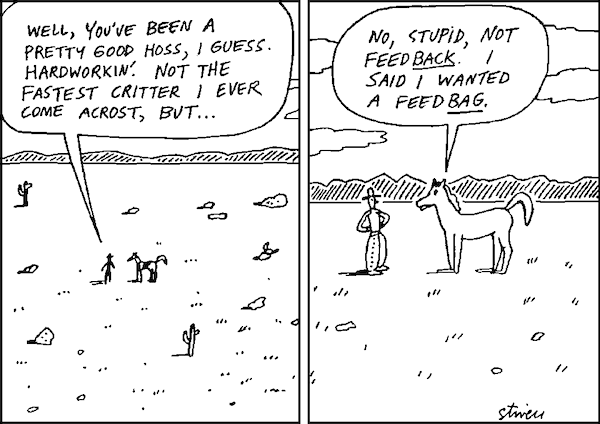Do You Have Any Feedback For Me?
For those who struggle to get meaningful feedback from their manager or peers, there is hope. The way we ask for feedback can help influence how it is delivered and improve the odds of it being constructive and actionable now and in the future.

It should not be controversial at this point to say that feedback is one of the most impactful levers in our professional and personal development. The recognition of this has resulted in countless books and articles being written on how to deliver candid feedback in a kind, empathetic way. For the experienced and uninitiated alike, speaking candidly with someone about difficult topics can range from uncomfortable to overwhelmingly terrifying. Practicing “Radical Candor” is tables-stakes in most every leadership course and professional development program.
Despite how critically important it is to give feedback, this education is largely targeted toward people managers. This makes sense, of course; the manager relationship can be one of the most influential relationships in a person’s career. Regrettably, this leaves those who are hungry for feedback at a disadvantage for two reasons: not all managers are equally adept at giving feedback; and feedback can come from anyone, not just the person’s manager.
For managers and individual contributors alike, requesting feedback demands a certain vulnerability. Given well, this feedback can have a profound impact on the way we work and the relationships we form. Given poorly, it can leave us confused, disappointed, hurt, or aimless.
However, for those who struggle to get meaningful feedback from their manager or peers, there is a silver lining: the way we ask for feedback can help influence how it is delivered and improve the odds of it being constructive and actionable now and in the future. Additionally, it’s important to note that the foundation of feedback is bi-directional trust, and these strategies can also help to establish and reinforce that baseline.
Be Specific
“Do you have any feedback for me?” is perhaps the easiest question to ask, but it can have some negative side-effects. It is a boundless question, and it puts the feedback-giver in a precarious position. They must now, on the spot, decide on a topic, the level of granularity on which to focus, how objective or subjective the feedback should be, and how to deliver the feedback in a fixed amount of time. Being specific about the feedback you would like causes a few things to happen.
First, requesting specific feedback makes it clear that there is a certain subject or aspect of your growth that you are personally trying to invest in. This is also your opportunity to frame the type of response you are looking for, such as requesting brutal honesty or being transparent that the subject may be sensitive to you.
Second, the specificity of the request establishes bounds on the conversation. By leaving the subject matter open-ended, it may be difficult for you or your feedback partner to hone in on the particular area you are seeking guidance in a reasonable amount of time. By being upfront about what you would like to discuss, this shows that you value the other person’s perspective as well as their time.
Lastly, this helps protect against “top of mind” responses. Depending on the individual you are asking and the various fires of the day, you may receive thoughts on whatever is the highest priority for them at the moment, not necessarily what is most relevant to you, your goals, or your growth. By guiding the conversation in a specific direction, you have the opportunity to bring their attention to a topic that may not be demanding their immediate attention but is important nonetheless.
Dehumanize it
Often, the response to a request for feedback is “you’re doing great!” While this type of praise is enjoyable to hear in the moment, this does not actually constitute real feedback, which is based on situational context, behaviors, and the resulting impact. The banality of a simple recognition of “doing a great job” does not actually provide any growth trajectory or actionable next steps. One of the sad realities of giving feedback is that it is simply difficult for people to mentally separate criticisms or praise of a person from a person’s actions or output.
If you are struggling to get actionable feedback, consider reframing the question you are asking from something self-focused to something more output-focused. For example, instead of asking “Do you have any feedback for me on the presentation?”, you could ask “What part of the presentation stood out to you, and what could I have highlighted more?” Or, instead of asking “How am I doing in my role of Tech Lead?” you might ask, “What are the aspects of tech leadership that this team is going to need in the next few months?”
Breaking these discussions down into smaller, objective pieces offers an opportunity to make it actionable: “What I'm hearing is the success criteria of the project aren't clear enough. Do you have any ideas for how to improve the clarity?”
Be Receptive
It may seem obvious, but a key component of asking for feedback is receiving the feedback. However, for many of us, the act of hearing feedback (especially the critical kind) triggers our defense mechanism of fight or flight. We may react instinctively with justification of our actions, or we may immediately begin strategizing for how to end the uncomfortable conversation as quickly as possible. Both outcomes belie the intention of getting feedback in the first place.
It is important to remember to defer judgement and absorb the information being presented. Understand that giving feedback can be as difficult as hearing it, and everyone has a unique perspective. Whether or not you agree with the feedback, it is important to empathize with the person giving it.
As you are receiving feedback, here are a couple things you can do to guide the conversation and engage more deeply: As you are listening, take notes. This is a form of active participation in the conversation, and it will help to disassociate the emotional response. Also, ask clarifying questions to guide the conversation to specific areas of focus. A display of genuine curiosity can help propel the conversation into more meaningful levels of depth and establish empathy and trust.
The act of giving and receiving feedback will continue to be a critical part of how we develop ourselves and others, but it is not a unidirectional pursuit that applies to managers alone. Giving and receiving feedback are equally hard, and it is up to both parties to help guide that conversation to the optimal outcome. As the requester and recipient of feedback, your role and responsibility in that dialogue will help determine what you get out of it.



